Jacek Wasilewski
Building a Scalable, Effective, and Steerable Search and Ranking Platform
Sep 04, 2024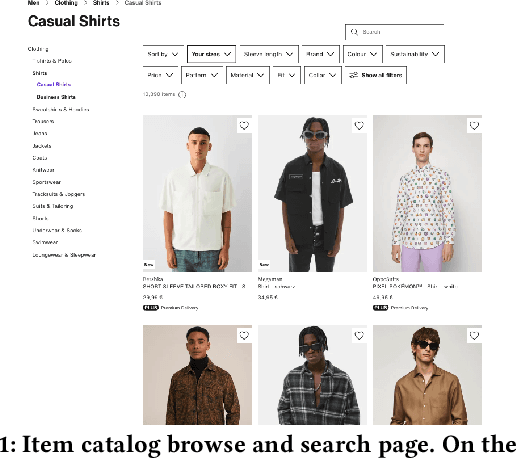

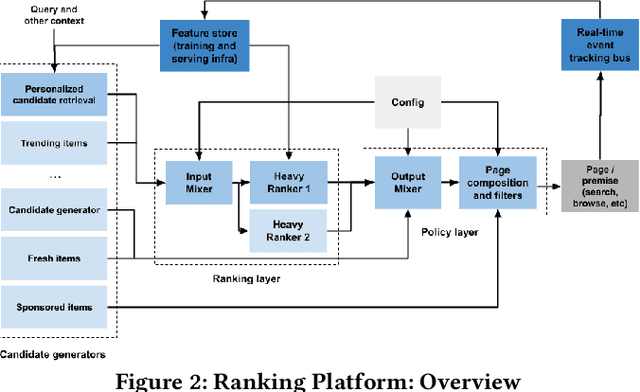
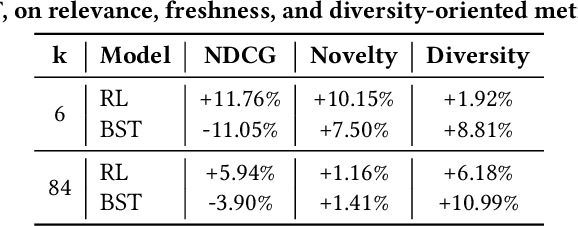
Abstract:Modern e-commerce platforms offer vast product selections, making it difficult for customers to find items that they like and that are relevant to their current session intent. This is why it is key for e-commerce platforms to have near real-time scalable and adaptable personalized ranking and search systems. While numerous methods exist in the scientific literature for building such systems, many are unsuitable for large-scale industrial use due to complexity and performance limitations. Consequently, industrial ranking systems often resort to computationally efficient yet simplistic retrieval or candidate generation approaches, which overlook near real-time and heterogeneous customer signals, which results in a less personalized and relevant experience. Moreover, related customer experiences are served by completely different systems, which increases complexity, maintenance, and inconsistent experiences. In this paper, we present a personalized, adaptable near real-time ranking platform that is reusable across various use cases, such as browsing and search, and that is able to cater to millions of items and customers under heavy load (thousands of requests per second). We employ transformer-based models through different ranking layers which can learn complex behavior patterns directly from customer action sequences while being able to incorporate temporal (e.g. in-session) and contextual information. We validate our system through a series of comprehensive offline and online real-world experiments at a large online e-commerce platform, and we demonstrate its superiority when compared to existing systems, both in terms of customer experience as well as in net revenue. Finally, we share the lessons learned from building a comprehensive, modern ranking platform for use in a large-scale e-commerce environment.
UNICON: A unified framework for behavior-based consumer segmentation in e-commerce
Sep 18, 2023



Abstract:Data-driven personalization is a key practice in fashion e-commerce, improving the way businesses serve their consumers needs with more relevant content. While hyper-personalization offers highly targeted experiences to each consumer, it requires a significant amount of private data to create an individualized journey. To alleviate this, group-based personalization provides a moderate level of personalization built on broader common preferences of a consumer segment, while still being able to personalize the results. We introduce UNICON, a unified deep learning consumer segmentation framework that leverages rich consumer behavior data to learn long-term latent representations and utilizes them to extract two pivotal types of segmentation catering various personalization use-cases: lookalike, expanding a predefined target seed segment with consumers of similar behavior, and data-driven, revealing non-obvious consumer segments with similar affinities. We demonstrate through extensive experimentation our framework effectiveness in fashion to identify lookalike Designer audience and data-driven style segments. Furthermore, we present experiments that showcase how segment information can be incorporated in a hybrid recommender system combining hyper and group-based personalization to exploit the advantages of both alternatives and provide improvements on consumer experience.
Reusable Self-Attention Recommender Systems in Fashion Industry Applications
Jan 17, 2023Abstract:A large number of empirical studies on applying self-attention models in the domain of recommender systems are based on offline evaluation and metrics computed on standardized datasets. Moreover, many of them do not consider side information such as item and customer metadata although deep-learning recommenders live up to their full potential only when numerous features of heterogeneous type are included. Also, normally the model is used only for a single use case. Due to these shortcomings, even if relevant, previous works are not always representative of their actual effectiveness in real-world industry applications. In this talk, we contribute to bridging this gap by presenting live experimental results demonstrating improvements in user retention of up to 30\%. Moreover, we share our learnings and challenges from building a re-usable and configurable recommender system for various applications from the fashion industry. In particular, we focus on fashion inspiration use-cases, such as outfit ranking, outfit recommendation and real-time personalized outfit generation.
Reusable Self-Attention-based Recommender System for Fashion
Nov 29, 2022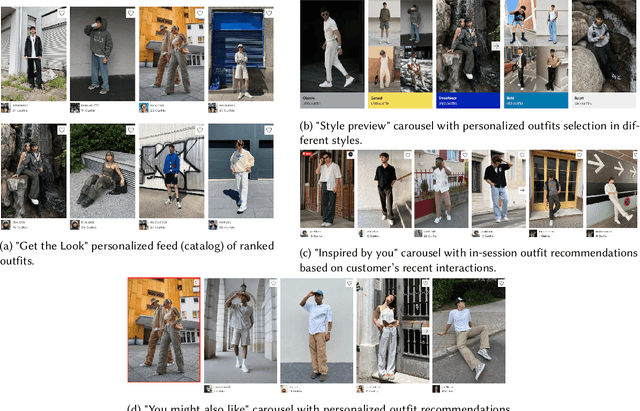
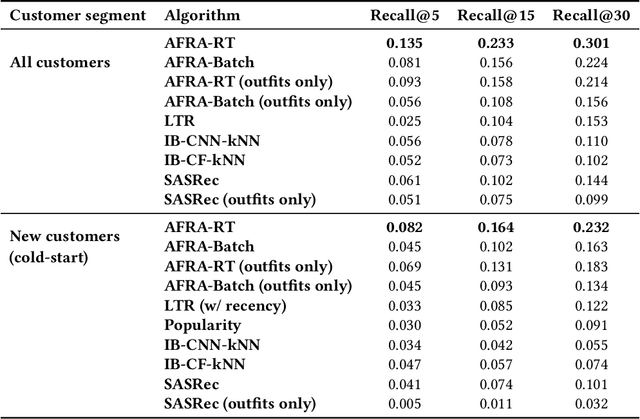


Abstract:A large number of empirical studies on applying self-attention models in the domain of recommender systems are based on offline evaluation and metrics computed on standardized datasets, without insights on how these models perform in real life scenarios. Moreover, many of them do not consider information such as item and customer metadata, although deep-learning recommenders live up to their full potential only when numerous features of heterogeneous types are included. Also, typically recommendation models are designed to serve well only a single use case, which increases modeling complexity and maintenance costs, and may lead to inconsistent customer experience. In this work, we present a reusable Attention-based Fashion Recommendation Algorithm (AFRA), that utilizes various interaction types with different fashion entities such as items (e.g., shirt), outfits and influencers, and their heterogeneous features. Moreover, we leverage temporal and contextual information to address both short and long-term customer preferences. We show its effectiveness on outfit recommendation use cases, in particular: 1) personalized ranked feed; 2) outfit recommendations by style; 3) similar item recommendation and 4) in-session recommendations inspired by most recent customer actions. We present both offline and online experimental results demonstrating substantial improvements in customer retention and engagement.
* FashionXRecSys'22: Workshop on Recommender Systems in Fashion, September 23, 2022, Seattle, WA. Parts published in RecSys 2022 (industry track)
 Add to Chrome
Add to Chrome Add to Firefox
Add to Firefox Add to Edge
Add to Edge